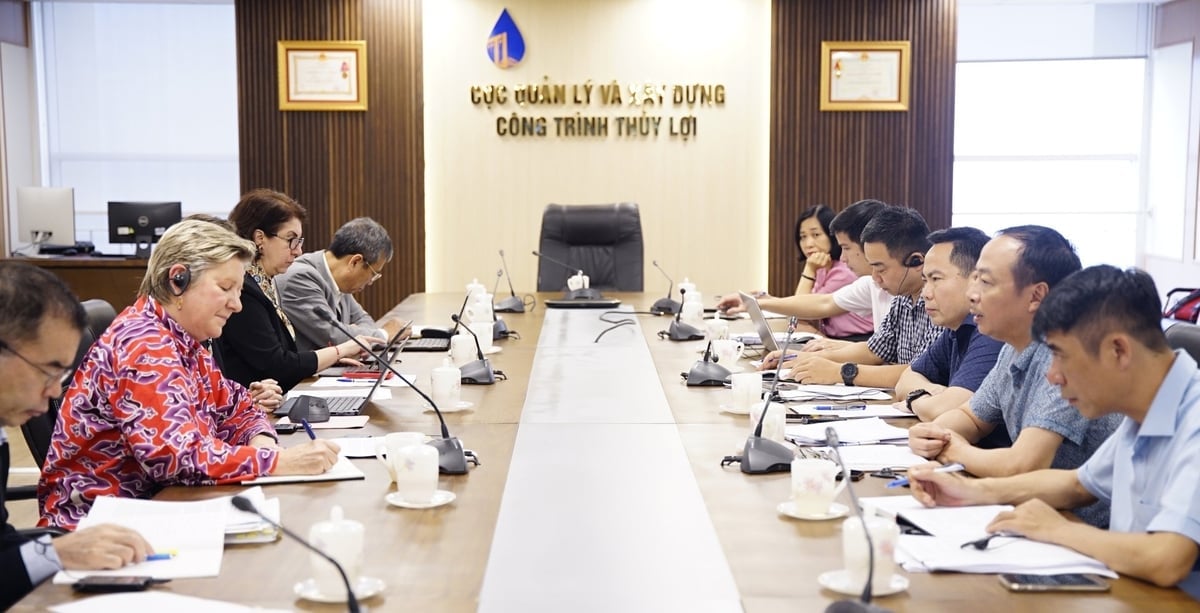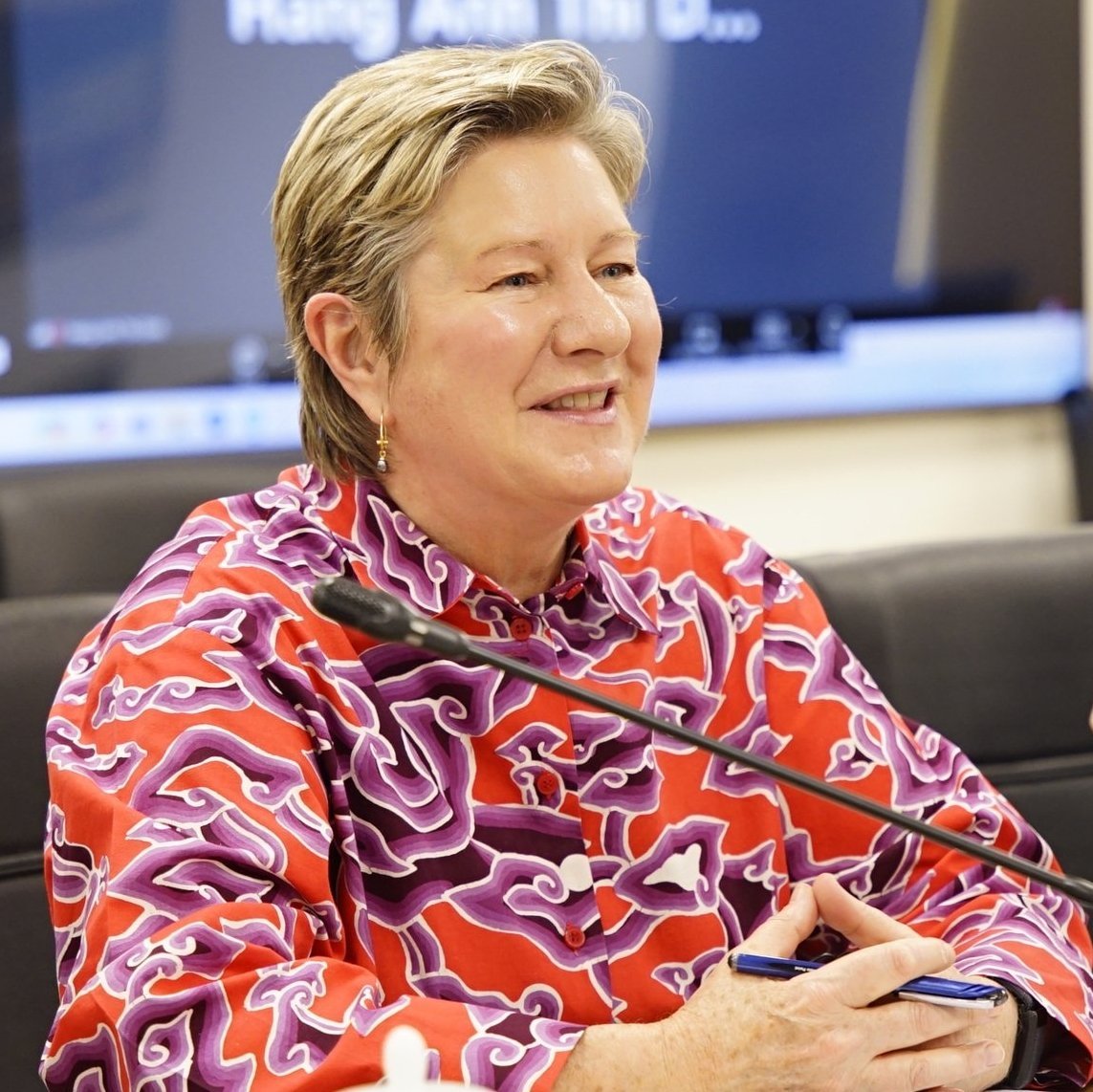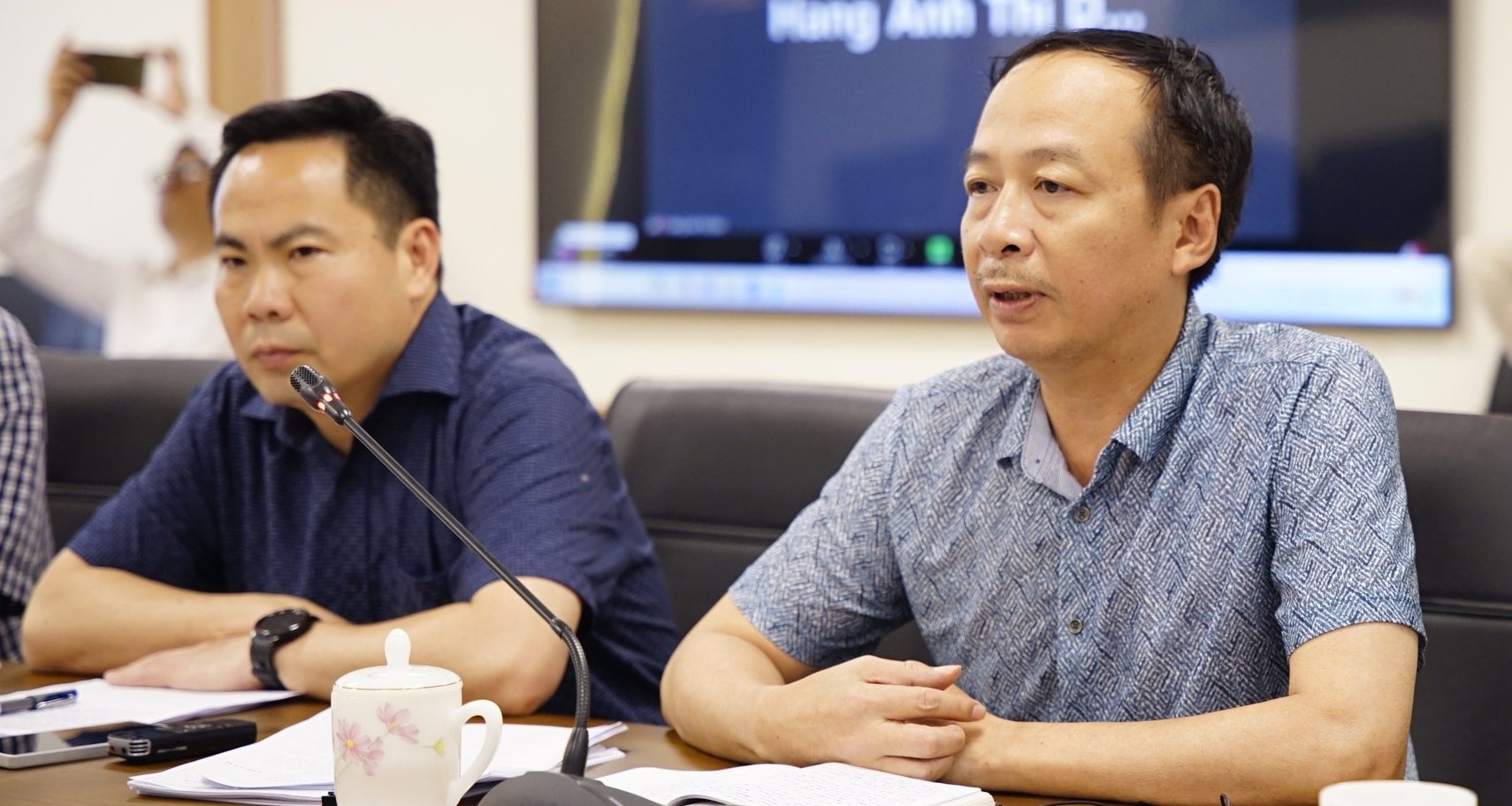December 1, 2025 | 19:47 GMT +7
December 1, 2025 | 19:47 GMT +7
Hotline: 0913.378.918
December 1, 2025 | 19:47 GMT +7
Hotline: 0913.378.918
The WB8 project was officially completed on June 30, 2023. Following project closure, the World Bank initiated field activities to supervise the implementation of the Post-Closure Action Plan (PCAP) and conduct a Rapid Dam Risk Assessment (RDRA).

Department of Water Works Management and Construction (Ministry of Agriculture and Environment) works with the World Bank on plans after the dam repair and safety improvement project (WB8). Photo: Linh Linh.
Kathy Whimp, Operations Manager of the World Bank in Vietnam, stated that although the project has concluded, Vietnam is still required to continue fulfilling its environmental and social commitments in accordance with the financial agreement signed with the World Bank until all obligations are completed or the loan is fully repaid. If there are unresolved issues, the World Bank will submit a Post-Closure Action Plan (PCAP) to the Government to address the remaining concerns.
According to Whimp, the World Bank assessed the project as generally successful, bringing many positive outcomes, as many dams that were previously in severely degraded condition have been significantly improved. However, due to potential risks, the World Bank decided to expand the inspection and funded an independent unit—Damwatch—to evaluate 47 dams across 7 provinces further, accounting for approximately 10% of the total dams under the project.
Damwatch reviewed technical documents, including construction acceptance reports, handover records, and emergency preparedness plans, and conducted interviews with provincial departments, local communities, and other stakeholders. Thanks to the cooperation of the Central Project Management Unit (CPMU) and the provinces, the assessment gathered substantial and important information. The results showed that many dams had been effectively upgraded. However, several structures still presented issues, meaning there is a risk of significant damage to critical components of the dams.

Kathy Whimp, Operations Manager of the World Bank in Vietnam, speaking at the meeting. Photo: Linh Linh.
“We consider this project to be an exceptional case compared to other completed projects. That’s why, at the Country Director level of the World Bank, we have agreed to allocate a portion of our internal funding to allow our expert team to continue providing technical support to Vietnam. This is quite rare, because typically, once a project concludes, technical support also ends. We are committed to continuing technical support to assist the ongoing efforts of stakeholders in Vietnam,” the Whimp affirmed.
Vuong Quoc Thiet, Deputy Director of the Department of Water Works Management and Construction, affirmed that ensuring the safety of completed infrastructure projects still requires close monitoring. He noted that, even after basic construction projects are completed and put into operation, unresolved issues may still remain. Moreover, specific technical problems or risks can only be identified in the post-project phase. Therefore, continued supervision and communication are necessary to ensure timely remediation and sustainable effectiveness of the structures.
According to Thiet, with a total of over 7,000 irrigation dams nationwide, the review, assessment, and early detection of risks are extremely important. The Ministry of Agriculture and Environment has issued specific directives and is implementing multiple action programs to proactively prevent risks from afar and respond promptly to safety threats. He called on the World Bank to continue supporting Vietnam by providing technical assistance, funding, and expert guidance for investigation and survey activities aimed at safeguarding public assets and protecting people’s lives.

Vuong Quoc Thiet (right), Department of Water Works Management and Construction at the meeting. Photo: Linh Linh.
For structures identified as high-risk, urgent action is needed before the upcoming rainy and storm season, along with a strategic roadmap for interventions on the remaining structures in the next phase. Given that 47 dams have been assessed, it is not feasible to address all at once; thus, prioritization based on urgency is necessary to ensure effective phased implementation.
Additionally, some projects remain entangled in procedural bottlenecks at the local level, particularly regarding site clearance. The Department will continue advising the Ministry to issue official guidance urging provinces to promptly complete the remaining components, contributing to the overall goal of the WB8 project.
At the working session, Halla Maher Qaddumi, Senior Water Economist at the World Bank, shared that the Bank had held several productive discussions with the Central Project Management Unit and relevant localities regarding the post-project assessment results. The two sides had agreed on several specific actions to address the remaining issues. Some issues have already been resolved by local authorities, while others are in the process of seeking provincial budget allocations to carry out pending tasks, such as completing spillway structures.
Translated by Linh Linh

(VAN) Lao Cai’s forestry sector is stepping into the spotlight with a series of pioneering initiatives in forest management, monitoring, and sustainable development aimed at generating carbon credits.

(VAN) The Provincial Competitiveness and Governance Index (PCGI) is a tool designed to reflect the quality of local governance.

(VAN) An environmental expert has outlined eight strategic actions for Vietnam to successfully meet its commitment to achieve Net Zero emissions by 2050.

(VAN) After the institutional merger, Da Nang possesses significant forest-carbon reserves and is proactively engaging in the carbon market, creating a new revenue stream.

(VAN) An Giang strengthens communication against IUU fishing, increases inspections and sanctions, and is determined to remove the EC’s “yellow card” while developing a sustainable fisheries sector.

(VAN) As green transition becomes a global trajectory, Viet Nam’s biggest challenge is not only technology and models, but how to ensure that capital flows reach the right beneficiaries.

(VAN) The Ministry of Agriculture and Environment must spearhead the construction of green governance, spanning decision-making processes and investment standards to policy evaluation mechanisms.